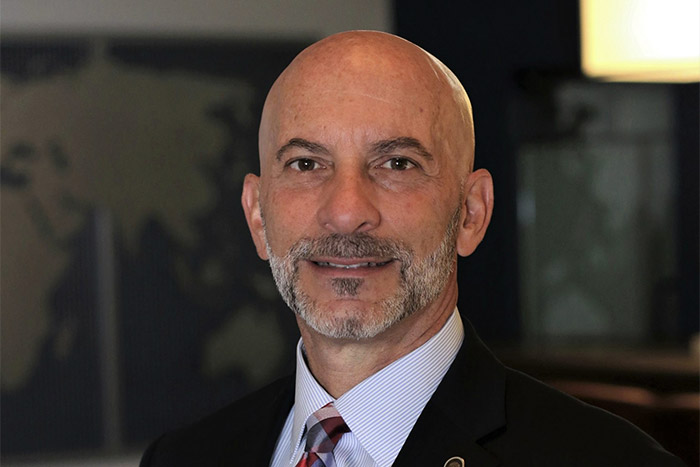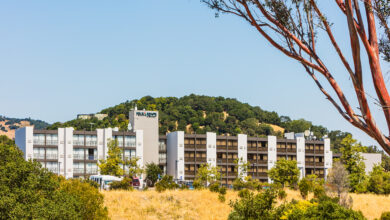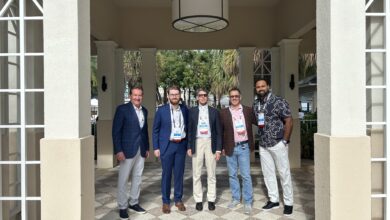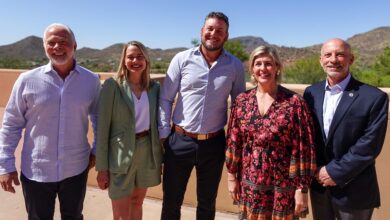![Shahid javed[1]](https://www.hotelinteractive.com/wp-content/uploads/2023/05/Shahid-Javed1-scaled-780x470.jpg)
Engaging with Executives: Aimbridge EVP and Chief Procurement Officer Shahid Javed
By David Berman | May 5, 2023
Our Engaging with Executives series consists of one-on-one Q&As with executives around the hospitality industry, breaking down recent trends and news in their companies and the industry as a whole.
Today’s interview is with Shahid Javed, EVP and Chief Procurement Officer for Aimbridge Hospitality. Javed joined the company in 2021 and has guided the company’s procurement efforts. Before Aimbridge, Javed led procurement at TIAA, JLL and BP.
In this Q&A, Javed discusses Aimbridge’s procurement and project management strategies in the face of supply chain disruptions, a global pandemic and inflation, as well as the company’s expanded procurement team and ESG efforts.
Hotel Interactive: Something I’ve been hearing about from a lot of people in the industry, and that is affecting industries that aren’t hospitality, is supply chain disruption issues. Starting off, how would you say those issues have evolved over the past year or so, and where would you say we’re at now with those problems?
Shahid Javed: That’s a great question. As you all know, the last two, two and a half years, it has been difficult for any industry, and every child knows that we have a supply chain problem, right? So it’s been a challenge for everybody out there. It was tough right when the hotels started shutting down and the suppliers started kind of not being able to provide the solutions. It was tough. I would say Aimbridge, because of our deep relationship with suppliers and having a very strong focus on strategic sourcing and supplier relationship management, we’ve been able to navigate that landscape really, really, really well. As we stand today, I will say things are pretty much back to pre-COVID levels in terms of availability of products.
During the peak COVID era we had to work very, very closely with our key strategic suppliers on what we call menu engineering. We will work with chefs on finding alternative products. If one meat wasn’t available, one potato wasn’t available, and we had a substitution that we could bring in, we worked with those chefs on the menu engineering, but we also worked very closely with our suppliers and found alternative products. As you imagine in many of our hotels, the brands create standards. So we work with brands also on alternative products as well that they allowed to be supplied, and it really, really worked well.
But it is a different story when it comes to day to day hotel operations, from doing renovations and PIPs. When it comes to FF&E products and other renovation equipment and materials, we had to pivot our strategies. We had a lot of sourcing coming in from the Far East. We had to pivot to local sourcing and find suppliers domestically and really pivot pretty quickly there as well. But really, it was working with those suppliers and finding solutions to the challenges we had. Even today, I would say that the lead times for FF and E have improved and are pretty much stable now.
HI: What is the importance of relationships when it comes to procurement, especially in a time where the pandemic was happening and everyone was scrambling on both the operator and the supplier side?
SJ: Yeah, I would say that’s obviously a key differentiator for Aimbridge. We manage 1500 hotels, that gives us scale. Scale means lots of things. It means we’re able to aggregate our buying power and get competitive pricing. But a big part of that scale is that you are a critical customer for the supplier. You have leverage with them, you partner with them, and you’re a big part of their business. So when you have that relationship, suppliers would work with you. Our model in our supply chain has been that it has to be a win-win situation for both Aimbridge as well as our suppliers because jointly we try to provide the best results for our owners. We manage these hotels, we manage their costs, and collectively between us and suppliers we’re able to find best solutions that bring the best outcomes for the hotels and the properties we manage.
This is where having better supplier relationships and fewer suppliers really makes a difference. When you have that leverage with the suppliers, you have connections at the top of the house of the suppliers. You can pick up the phone and talk about the challenges. As long as you’re open to ideas, you would be surprised how well the suppliers show up. So I would say since the merger between Interstate Hotels and Aimbridge (in 2019), it has given us lots of leverage to negotiate our agreements with the suppliers. We went through that process and had great agreements in place. But that also helped us leverage that spend we have with the suppliers and really elevate that relationship.
HI: Next, this is kind of a nuts and bolts question on long term supplier agreements. With firm pricing in these agreements, that really helped Aimbridge in an inflationary environment. Could talk a little bit about these types of agreements, how that works between supplier and buyer and how these deals make sense for both sides?
SJ: So, a lot depends on what you’re buying, right? So I can use some examples with you. So if you’re buying commodity products like food and meats and vegetables, in some of those cases, you don’t have firm pricing for the entire term of the agreement. You have certain clauses that allow price changes to happen, increases to happen. And this is where again, that relationship really comes into play, and you manage the product and the cost. Then with those relationships in place, if one product is going high because it’s very scarce in supply, you’re able to provide other products that may be more readily available to manage the costs. On the other hand, you may have suppliers, you may have other products where you do have firm pricing for a year or two years or three years. And as inflation comes in, you still are able to maintain the pricing position you had when the deal was done because we have firm pricing.
The other thing I would I would share with you is again, if I shift from the day-to-day operating supplies, and day-to-day procurement to more around innovations and capital projects, because that’s a big part of our sprint as well, that’s where, again, you have to be creative sometimes to find new alternative sources. I talked about the COVID time when it was challenged with congestion. Everybody knows there were tankers parked out there in the port for a long time, and the lead times were getting longer and longer. One of the drivers of procuring from overseas is that generally the cost of the product is lower. However, if your shipping cost goes up double or triple, that cost benefit doesn’t stay anymore. So to us, you know, finding local suppliers and alternative suppliers in that space was very helpful both to manage the cost but also very importantly to manage the lead times because our commitment to our owners is we will manage their projects on budget, on schedule. Optimizing both are key parameters. So switching from offshore suppliers to onshore suppliers was a big strategy where we had the option to switch from those suppliers.
HI: Aimbridge has doubled its procurement team in the past 18 months or so. So my first question off of that is, what does a larger team allow you to accomplish in terms of procurement goals?
SJ: So there’s one word: Specialization. But let me expand on that for you. So I would say we are the only hotel management company that provides procurement and project management solutions that cover the entire life cycle of the hotel. I’m very, very pleased to say that our procurement team is not just made of only procurement and purchasing people. It’s an extremely diverse team. So I have a team of folks who are fantastic in what we call strategic sourcing and supply chain management. We do category management as well where you start managing categories of spend; not supplier by supplier or purchase by purchase, but categories of spend.
So I have those traditional supply chain management or procurement members who are experts in category management, but then I have a different team of people who have design, construction management, and architecture backgrounds. They are the folks who are leading the projects, that are leading the renovation, leading the PIPs, they run the whole design and construction part of the business. It’s a very different skill set than generally just purchasing people.
Then I have a third team, that team oversees all CapEx projects. This team is made up of engineering background folks. They have the technical knowledge and expertise of these systems; fire safety systems, facades, roofs, chillers, boilers. Their value is not just to go find the cheapest solution. Their value is value engineering. Sometimes you’ll find a system that may not be working very well, and the supplier says “hey, let’s go replace the system for a very large cost.” Our team comes in and says “you know what, we can repair it.” We can find other solutions, and we can save lots of dollars for the owners by not replacing the equipment by repairing it.
On top of that now we have people who are very strong in data analytics. Again, totally different skill set. They are helping us with putting together our data with all the hotels we manage. We have a tremendous amount of data as to what the hotels are buying, what the patterns are, what the utilization of contracts are. So we are running lots of data analytics on our spend.
Then I would say on top of that, we have also gone very deep into ESG, which is very critical to the owners, to the brands. We have hired a procurement manager for ESG. I can come back and talk more about ESG because I’m really passionate about that. But what I’m describing for you is in this team that I’ve described from procurement people to design and construction people to engineering people to data analytics people to ESG … I used the word specialization. Growing our staff helps us specialize in each of these fields. I mentioned to you we provide a holistic set of services across the entire lifecycle from day to day operations, procurement, PIPs and renovations to CapEx projects to FF&E procurement. This different skillscape comes into play for everything that you’re procuring and how you’re managing it. So, again, the answer to your question is specialization and adding more headcount has really helped us grow in the capability in the team and to provide very unique solutions for each problem you’re solving for the owners.
HI: Have there been any issues in trying to grow that team with staffing shortages impacting the industry? Or is there maybe a more viable pipeline on the procurement side right now?
SJ: Yeah, no, I would say with everything else out there, finding the right resources is not easy. We have a phenomenal recruiting team within Aimbridge. My team, my leadership team, partners very closely with our recruiting team, where we identify candidates, but I’ll be honest with you, it’s tough. It’s tough to find candidates who are available. Also, it’s tough because I’m not just finding a generalist procurement person, right? I’m finding a specialist in their space, whether they deal with CapEx projects, whether they deal with PIPs, renovations and construction, whether they’re dealing with certain categories of spend that we deal with, whether it’s FF&E procurement, or food and beverage procurement. We’re looking for a certain skill set there as well. So that narrows the number of people who we could be targeting. And it’s been tough, but it’s a relentless effort by our recruiting team, by our leadership to see who we can find. The best thing we have been able to do is tap into our networks as well. I have a team of people who, some of them have been with Aimbridge a very long time, 15 plus years. Plus, we have hired several new leadership positions and folks as well, and tapping into their network gives us a reach to a much larger potential target team that we could recruit and bring to Aimbridge.
HI: Moving forward, what’s the state of procurement and supply chain disruptions? How’s that going to look for you and your team? What are you thinking about on that level, and also forecasting for the industry in general?
SJ: Yeah, I would say the name of the game is planning. We did not see COVID happening. We did not see the financial crisis (coming). So the best way to handle it is plan, plan, plan, plan ahead of time. Give yourself plenty of time, so if there’s any unplanned disruption to the supply chain, you are better prepared for that. Secondly, what I would say is make sure you have alternatives and options available to you, so you can pivot pretty quickly. This is where, (if) you have good relationships with suppliers, this really comes into play.
In terms of my forecast of the future, I would say things are much more stable now. We conduct our quarterly business reviews with our strategic suppliers. We ask them to tell us what’s happening in the industry to gain some foresight, to gain some insights in terms of what’s expected. I’m very pleased to say that pretty much all our suppliers are saying things are much more stable now, whether it’s manufactured goods, whether it’s products available even from the Far East now, or FF&E coming from domestic suppliers.
We still expect inflation to continue this year, not at the same level as last year, but this year we will see some level of inflation continue. But the good news is, products are available, alternatives are available, and so I feel very, very positive. At the same time, I would say on the positive trend, owners were trying to survive the last couple of years because you didn’t have much travel. They have travel, which is coming back pretty strong. Occupancy has gone up quite rapidly. Business travelers are becoming very healthy as well. The owners know that they had some deferred maintenance on their equipment. They had some deferred CapEx projects. They absolutely are funding those projects. They are bringing money to say “hey, let me go fix this equipment or that equipment or repair something or upgrade some equipment.” They’re spending the money, and brands are also asking owners to refresh their hotels and refresh their products and execute the PIPs. So I see the demand increasing substantially, and continuing that increase. I don’t see that slowing down. But the good news is both the demand is high, but also the supply of products and services has become a lot more stable.
HI: Anything else you’d like to touch on?
SJ: Yeah, I would say ESG is something I mentioned briefly. It’d be good for me to expand on the ESG. Aimbridge partners very closely with the industry in this space. We are members of the AHLA Sustainability Committee. I represent Aimbridge on that board as well. We have helped shape the direction for ESG, across hospitality at least. AHLA launched something called the Responsible Stay. It talks about as an industry where we are going. You have brands who have certain mandates on their side, you have suppliers who are trying to say what do we do? And we all come together to say, how do we align on the goals? It’s a new space still, ESG, still a new space.
Where we have aligned with AHLA essentially is on four parameters. So it’s energy conservation. It’s water consumption. It’s waste and waste reduction and recycling. Then the fourth one is sustainable sourcing. Those four key parameters are underpinning the strategy and the future for ESG, and we are taking some very bold steps to measure the performance on those four. We are seeing that owners are very keen to make a difference in this space and really have a strong impact on the environmental side and really make ESG a differentiator. As I mentioned to you we have hired a senior manager for ESG procurement who is going to be 100% focused on this. We also are seeing owners spend CapEx dollars on energy retrofit projects, whether it’s LED lighting, whether it’s thermostats, whether it’s sensors to manage water, they are investing money to really save water and save energy.
Editor’s Note: This conversation was lightly edited for length and clarity.






Get involved!
Comments